|
|
|
Sort Order |
|
|
|
Items / Page
|
|
|
|
|
|
|
| Srl | Item |
| 1 |
ID:
189072
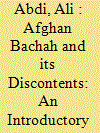

|
|
|
|
|
| Summary/Abstract |
Afghanistan is one of the few places where the category of bachah—the beardless young male—has maintained its aesthetic and erotic aspects in the public imagination. This article provides an introduction to the history of the various arrangements of man-bachah relationships in Afghanistan from the rise of the Afghan kingdom in the late eighteenth century. By looking at both primary and secondary sources, alongside ethnographic materials gathered during fieldwork in Afghanistan between 2016 and 2021, this article shows how the content and implications of the category of bachah have been in constant flux and intimately connected to wider social, political, and economic developments both inside the country and beyond.
|
|
|
|
|
|
|
|
|
|
|
|
|
|
|
|
| 2 |
ID:
152319
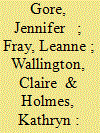

|
|
|
|
|
| Summary/Abstract |
Modern military organizations are making a concerted effort to recruit a more diverse range of people, with the role of women in the military at the forefront of debate. In Australia, in response to the changing role of the military and with the aim of positioning the military as an “employer of choice” for women, females are targeted as early as high school. Using data from a study of 6,492 Australian school students in Years 3–12, we examine student aspirations for military careers. Student aspirations were influenced by traditional perceptions of the military as a primarily masculine enterprise. Key reasons for student interest included dominant notions of masculinity, familial military experience, career options, and enlistment benefits. We argue that current views of the military among school children signal the need to shift such perceptions to appeal to a wider range of people and attract a more diverse workforce.
|
|
|
|
|
|
|
|
|
|
|
|
|
|
|
|
| 3 |
ID:
096520
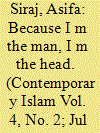

|
|
|
| 4 |
ID:
180002
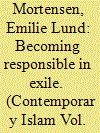

|
|
|
|
|
| Summary/Abstract |
Taking an ethnographic point of departure in the stories of three Syrian middle-class men in Amman, Jordan, in this article, I zoom in on the role of care in the everyday of exile, as I explore the young men’s attempts to be “responsible” young men despite challenging circumstances. Guided by Ahmed’s (2006) notion of lifelines, defined as those which direct us and allow us to find our way (ibid.: 12–14), I demonstrate how gendered norms and notions became objects of reflection and experimentation in exile, both enabling and forcing the young men I worked with to think through other ways of leading life as a man. Finding further inspiration in Naguib’s (2015) and Ghannam’s (2013) works on masculinity and care in the Middle East, I consider care as central to the process of negotiating a masculine identity in general as well as to the reconfiguration of a meaningful masculine position in exile specifically.
|
|
|
|
|
|
|
|
|
|
|
|
|
|
|
|
| 5 |
ID:
167644
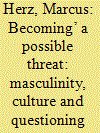

|
|
|
|
|
| Summary/Abstract |
A debate on masculinity and immigration rose across Europe in 2015 after an incident with sexual harassments taking place in Cologne, Germany. The incident refuelled a debate positioning unaccompanied young men as a possible threat. This article is based on a research project where we during this time ethnographically followed 20 young men, having arrived in Sweden as ‘unaccompanied’ minors. The aim is to examine how the young men themselves talk about, reflect on and negotiate masculinity and gender during this period. The article concludes that masculinity cannot be approached as something stable easily being inherited or transferred from one’s origins. One difference for ‘unaccompanied’ young men is how conflicts or tensions emerging in relation to issues of gender and masculinity tend to be interpreted differently, and publicly, putting the young men in a ‘gendered situation of questioning’.
|
|
|
|
|
|
|
|
|
|
|
|
|
|
|
|
| 6 |
ID:
171038
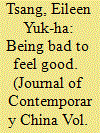

|
|
|
|
|
| Summary/Abstract |
The plight of male migrant workers in China warrants critical attention because their diminished opportunity for life success has created a public health issue. To cope with hopelessness and despair they engage in risky behaviors involving paid sex and drugs. This article extends Connell ’s notion of hegemonic masculinity, linking urban migration with a rampant ‘masculinity crisis’ engulfing these single migrant men. Interviews with 100 male migrants who admitted to regularly buying commercial sex in low-end and mid-tier bars revealed underlying cultural tensions which drive them to use paid sex and drugs to help them cope with their emasculated reality. This article facilitates understanding of China’s masculinity crisis against the backdrop of the nation’s post-socialist transition in a wider social, cultural, and historical structure.
|
|
|
|
|
|
|
|
|
|
|
|
|
|
|
|
| 7 |
ID:
107960
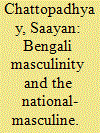

|
|
|
|
|
| Publication |
2011.
|
| Summary/Abstract |
This article examines how Bengali masculinity has been negotiated between national and ethnic/local notions of identity and suggests a new way of understanding this issue. Within the specific historiography of Bengali masculinity, concerns regarding physical strength, courage and virility of the Bengali male have been central tropes, challenged by the colonially constructed stereotype of the effeminate Bengali. The present article maps mainly nineteenth century discourses regarding Bengali masculinity and focuses on one particular strategy of three, namely, construction of a mode of mythic-historical discourse to reclaim a supposedly more masculine past for Bengali men. This suggests the notion of national-masculine as a gendered materialisation of the compensatory agency of Bengali masculinity. Shown to occur through the articulation of buddhibal in contrast with bahubal that negotiates with the hegemonic national-masculine, this throws new light on the emerging prominence of the bhadralok concept of a sophisticated Bengali gentleman.
|
|
|
|
|
|
|
|
|
|
|
|
|
|
|
|
| 8 |
ID:
152317
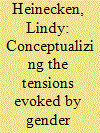

|
|
|
|
|
| Summary/Abstract |
The South African military has adopted an assertive affirmative action campaign to ensure that women are represented across all ranks and branches. This has brought about new tensions in terms of gender integration, related to issues of equal opportunities and meritocracy as well as the accommodation of gender difference and alternative values. The argument is made that the management of gender integration from a gender-neutral perspective cannot bring about gender equality, as it obliges women to conform to and assimilate masculine traits. This affects women’s ability to function as equals, especially where feminine traits are not valued, where militarized masculinities are privileged and where women are othered in ways that contribute to their subordination. Under such conditions, it is exceedingly difficult for women to bring about a more androgynous military culture espoused by gender mainstreaming initiatives and necessary for the type of missions military personnel are engaged in today.
|
|
|
|
|
|
|
|
|
|
|
|
|
|
|
|
| 9 |
ID:
144685
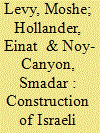

|
|
|
|
|
| Summary/Abstract |
This article seeks to explore the meanings of ‘masculinity’ as constructed by Israeli men in the sports arena. Specifically, it examines the place of sport in the lives of Israeli men as well as the factors and motivations driving them to this field. The research findings indicate a dialectical process that combines continuity and change in Israeli masculinity: on the one hand, a close connection between sports and ‘traditional masculinity’ that includes themes of physical strength and male brotherhood; on the other, diversity in sports practices, links between sport practices and personal well-being, weakening of the identification with specific sports teams and a tendency to watch sports broadcasts in a more individualized manner based on aesthetic preferences.
|
|
|
|
|
|
|
|
|
|
|
|
|
|
|
|
| 10 |
ID:
129978
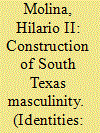

|
|
|
|
|
| Publication |
2014.
|
| Summary/Abstract |
I contend that masculinity formation in South Texas is linked to objects that have been deemed as 'manly'. This study is significant because it examines a group in the US population that, according to census predictions, account for a large percentage of the fastest growing and largest Latino group in the United States. This autoethnography research examines how pico de gallo - a type of salsa - and the barbeque grill assist working-class Mexican American males in constructing a masculine identity known as macho. The data are based on observing 30 social events in the Rio Grande Valley. The findings reveal a pursuit for an apex status of macho through these objects and the cultural transmission of gender roles to the next generation of males. This study concludes by offering suggestions in examining how masculinity, for men of colour, might be linked to marginalisation practices within a social structure.
|
|
|
|
|
|
|
|
|
|
|
|
|
|
|
|
| 11 |
ID:
176493
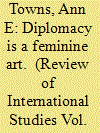

|
|
|
|
|
| Summary/Abstract |
The aim of this article is to examine whether and how diplomacy may be gendered, symbolically and rhetorically, using US representations of diplomacy as a case. Prior scholarship on gender and contemporary diplomacy is sparse but has shown that the symbolic figure of ‘the diplomat’ has come to overlap tightly with ‘man’ and be associated with traits often attributed to masculinity. Inspired by queer international relations methods, relying on the concept of ‘figuration’ and focused on US news media and biographies of diplomats from the past decade, this article uncovers and examines a palette of feminised figurations also at play in US representations of diplomacy, including the diplomat as ‘the “soft” non-fighter’, ‘the relationship builder’, ‘the gossip’, ‘the cookie-pusher’, and ‘the fancy Frenchman’. These feminised figurations alternate between configuring the diplomat as a woman and – more commonly – a (feminised) man. The analysis complicates rather than displaces existing claims, highlighting the importance of attention to slippages and challenges to dominant masculinised subject positions.
|
|
|
|
|
|
|
|
|
|
|
|
|
|
|
|
| 12 |
ID:
091289
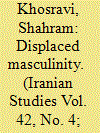

|
|
|
|
|
| Publication |
2009.
|
| Summary/Abstract |
Masculinity, like other kinds of social identity, is an ongoing construction in a dialogue between one's self-image and others' perceptions of one. The interplay between ethnicity and masculinity is a main theme in this article. Due to geographical displacement, the Iranian man's masculine identity has been challenged and renegotiated on the one hand by Iranian women's struggle for emancipation and on the other hand by the Swedish mediawork. Iranian men are displaced from the position of having a powerful gaze, which fixed and controlled women into a position of being an object of the gaze of others. The dominant gaze in Sweden makes them (in)visible in the same way their gaze makes women (in)visible in Iran.
|
|
|
|
|
|
|
|
|
|
|
|
|
|
|
|
| 13 |
ID:
150559
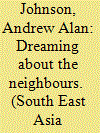

|
|
|
|
|
| Summary/Abstract |
For Marcel Mauss (2001 [1902]), magic involves border-crossing, with powers founded upon the potentiality presented by the exotic and the unknown. In a similar vein, Webb Keane (2003) points to the movement of religious objects that, via their very materiality, acquire new meanings as they move between one “representational economy” and another. Here, I look at the consumption of Thai necromantic objects by Chinese Singaporean Buddhists. These are, in some cases, Thai body parts, ritually processed and sold via the international marketplace via Chinese Singaporean entrepreneurs and used for local business competition. I argue that, through this process, these objects become fused with Chinese religious notions of potency, Orientalist exoticization, and a fetishization of the entrepreneur. In doing so, these dreams about the neighbours complicate our understandings of cosmopolitanism, masculinity, and the vicissitudes of capitalism.
|
|
|
|
|
|
|
|
|
|
|
|
|
|
|
|
| 14 |
ID:
183482
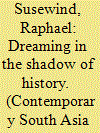

|
|
|
|
|
| Summary/Abstract |
Spatial mobility is often considered on large geographical scales: people move from distant villages to global cities, they migrate from one country to the next, or even to a whole new continent. Such large-scale migration comes with shifts in economic position, social status and cultural exposure, shifts that condition new figurations of belonging – or so the argument goes. In contrast, I ethnographically follow the looping movements of three young men in Lucknow who aspire to migrate but remain stuck, who find a whole new world by crossing the river, whose small steps reflect big dreams. As the world grapples with ‘lockdowns’ and ‘stuckedness’ in the Covid-19 pandemic, I sketch their aspirations, mental maps and the material restraints that condition their trajectories. Through them, I demonstrate how looping micro-mobilities – cruising through the night, dancing on stage, riding one's bike – can be as effective in fostering new figurations of belonging as the grand movements emphasized in literature on migration. I further explore which spaces enable and contain such micro-mobilities, rediscovering the potency of urban settings to make people feel at home and out of place in small but important ways.
|
|
|
|
|
|
|
|
|
|
|
|
|
|
|
|
| 15 |
ID:
171310
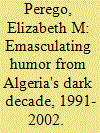

|
|
|
|
|
| Summary/Abstract |
This paper explores shifting notions of Algerian masculinities during the Dark Decade (approximately 1991–2002) as articulated through humor. Both in the period leading up to and during conflict, Algerian cartoonists and joke tellers played with socially accepted norms concerning male behavior. In the armed struggle, however, comedy reflected how the terrifying and random violence that characterized the conflict may have disturbed local gender relations and definitions. The conflict prevented men from practicing masculinity in preestablished ways, most notably through the protection of self, family, and community. The present article contributes to the broader literature on gender during the armed struggle as well as in the Middle East and North Africa more widely, to argue that humor, a critically under-considered aspect of the cultural lives of Algerians and men across the region, provided civilians with space to navigate changes in gender issues brought about by the harrowing circumstances of the Dark Decade.
|
|
|
|
|
|
|
|
|
|
|
|
|
|
|
|
| 16 |
ID:
103957
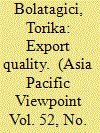

|
|
|
|
|
| Publication |
2011.
|
| Summary/Abstract |
Fijian bodies have become a valuable commodity in the economy of war. Remittances from workers overseas are Fiji's largest income - exceeding that of tourism and sugar export. This essay examines historical and contemporary representations of the black male body that perpetuate the exploitation of Fijians by inscribing the Fijian male body as warrior, criminal and protector. Taking a multidisciplinary approach informed by sociology, cultural theory, Pacific studies, visual culture, feminist and post-colonial theory, my practice is the vehicle through which I address issues of neocolonial commodification of Fijian bodies. Through an analysis of my own staged photographs and vernacular images taken by Fijians working for private security military companies and British and US armies, I hope to challenge audiences to consider their own perceptions of Fijian agency and subjectivity. By theorising the politicisation of the black body and interrogating colonial representations of blackness, I argue that we can begin to create links between the historical and contemporary exploitation of Fijians and that at the essence of both is an underlying racial hierarchy and economic requirement for cheap and, arguably, expendable labour.
|
|
|
|
|
|
|
|
|
|
|
|
|
|
|
|
| 17 |
ID:
142055
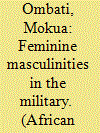

|
|
|
|
|
| Summary/Abstract |
Historically, the military presents more defined gender boundaries than any other state institution. Assignment to traditionally non-feminine roles means crossing gender-assigned and constructed boundaries. This article explores the interplay of the contradictory dynamics of gender in the military through the lens of Kenyan women combatants in the war against al-Shabaab insurgents in Somalia. Military combat roles have traditionally relied on and manipulated ideas about masculinity and femininity. The study uses the twin theoretical frameworks of sociocultural capital and cultural scripts, refined by a gender-framing perspective, to interpret the sociocultural attitudes of masculinity and femininity in terms of war, the military and militarism.
|
|
|
|
|
|
|
|
|
|
|
|
|
|
|
|
| 18 |
ID:
083596
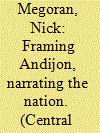

|
|
|
|
|
| Publication |
2008.
|
| Summary/Abstract |
Tashkent's handling of anti-government protests and violence in the city of Andijon on 13 May 2005 has generated enormous controversy and had significant political repercussions. However, there has been no detailed analysis of rival interpretations of what happened. This paper begins to redress this lacuna by analysing a book on the subject authored by the President of Uzbekistan, Islam Karimov. Using framing theory, it identifies four key themes deployed in the narrative to delegitimize the government's opponents: terrorism and criminality; inauthentic Uzbekness and deviant masculinity/religiosity; constitutional illegitimacy; and the subversion of the scientific laws of states. Significantly for an understanding of regime legitimization and nationalism in Uzbekistan, no recourse is made to the government's intellectual framework known as the 'ideology of national independence'. The paper points to the need for further research to enable scholars to develop a deeper and more nuanced understanding of the contemporary politicization of national belonging in independent Uzbekistan
|
|
|
|
|
|
|
|
|
|
|
|
|
|
|
|
| 19 |
ID:
133831
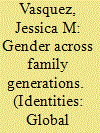

|
|
|
|
|
| Publication |
2014.
|
| Summary/Abstract |
How do conceptions of gender - attitudes, expectations, and behaviours - change from generation to generation in Mexican American families? The notion of gender as socially constructed allows for the possibility of change, yet existing studies documenting change provide insight into why gender changes occur but do not sufficiently describe how this process happens. Based on interviews with three-generation Mexican American families in California, this article finds that reflection on natal family experiences and intergenerational family communication - autobiographical stories, lessons, and advice - are mechanisms that shift masculinity, femininity, and gender relations. Men use their natal family dynamics to rethink male dominance in favour of improved familial and romantic relationships whereas women consider their biographies and cross-generational advice to challenge patriarchy and become more educated and assertive. Families are crucibles of social change: reflection on natal family experiences and communication that crosscuts family generations actualise and initiate paradigm shifts about
|
|
|
|
|
|
|
|
|
|
|
|
|
|
|
|
| 20 |
ID:
161642
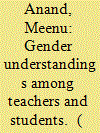

|
|
|
|
|
| Summary/Abstract |
Gender issues are of paramount interest in school education in India, but questions remain about what girls and boys actually learn about gender once they are in school. Are schools really places where teachers effectively combat traditional gender stereotypes among students? Relying on primary research in schools in Delhi, this article examines teachers’ biases and stereotypes regarding gender issues. Comparing this grassroots reality to the opinions on masculinity and femininity held by children in the same schools, the article identifies a need for more focused teacher education. The persistent gaps between tall claims about improved gender awareness, ambitious promises in policies and existing ground realities pose significant educational challenges for India, especially with regard to methods of promoting consciousness about gender-related issues in all domains of education.
|
|
|
|
|
|
|
|
|
|
|
|
|
|
|
|
|
|
|
|
|